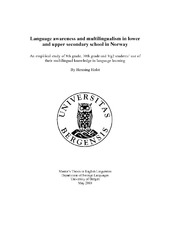| dc.description.abstract | Students in the Norwegian school system have to learn at least two languages, Norwegian and English, whereas, most students learn an additional L3, and many students also have knowledge of other languages from outside school. The majority of students in Norway are, therefore, multilingual. Attention to building multilingual competence has been a central aim for curriculum reforms both in Norway with the Norwegian curriculum, Kunnskapsløftet, as well as in several other European countries. An interest for multilingualism has at the same time had an upsurge in several academic disciplines where it has been noted a connection between multilingualism and language awareness (Jessner 2006; 2008a). The attention to multilingualism and language awareness is not necessarily seen to the same extent in language instruction in schools as in the curriculum. Research conducted on teachers’ attitudes towards language learning, among others by Haukås (2016), shows that many language teachers do not necessarily see the benefit of comparing different languages as part of the instruction. This thesis investigates the students’ views on their language learning to inquire how the students perceive having knowledge of several languages and whether they use their multilingual knowledge as part of their language learning. By using a questionnaire, the students' language experience is registered, along with their motivation for language learning and awareness of the possibility of comparing languages, use of meta-language and learning strategies. The students in the study have knowledge of Norwegian, English and French, as well as possible other languages. The research is conducted in 8th grade and 10th grade at lower secondary school, and Vg2 at upper secondary school in Norway. The hypotheses are (1) that students with additional languages than Norwegian, English and French will show higher language awareness, (2) that students who have learnt their languages for a more extended period will show higher language awareness, and (3) that students who are more motivated for language learning will show higher language awareness. The findings indicate that the participants in the study generally report to compare languages and to transfer language knowledge across their known languages. However, no explicit support is found for hypothesis 1 and 2 in the findings. Strong support is found for hypothesis 3. The thesis suggests that more considerable attention to showing the potential of building language awareness across languages will enable multilingual students to enhance their language awareness. | en_US |
